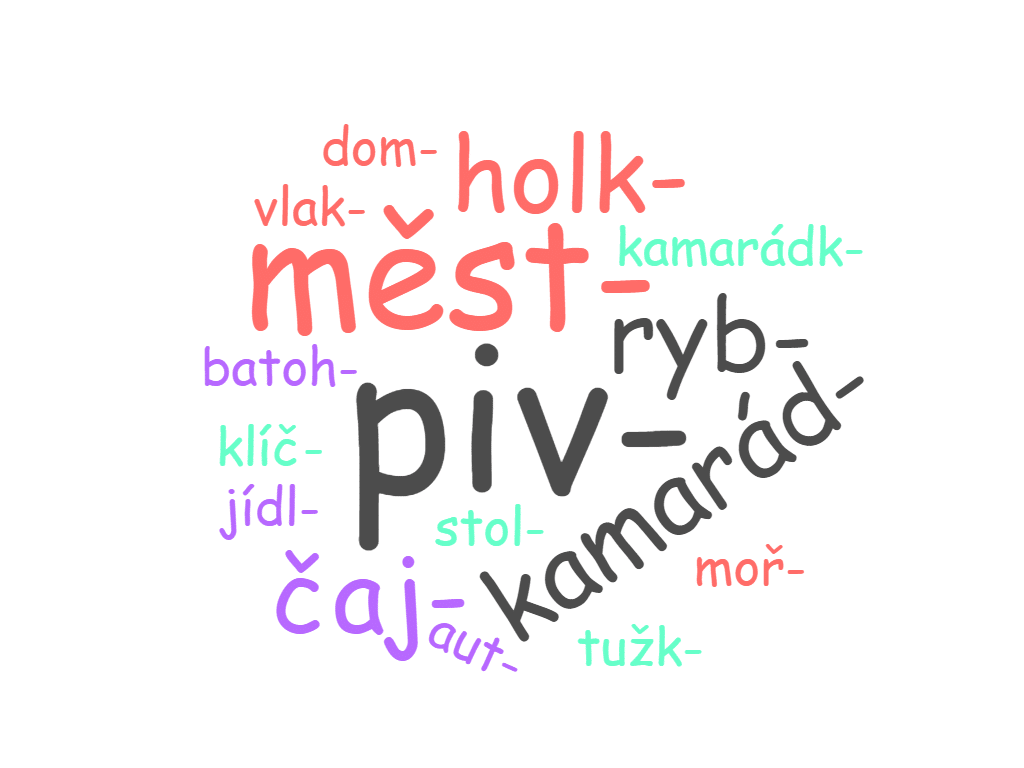1.8 – Noun Stems (Hard and Soft)
In this lesson you will learn about nouns stems. Noun stems are the form of the noun that we will add endings to, for example to make them plural. Additionally, you will learn about the difference between hard and soft stem nouns. Nouns in Czech are either hard or soft stem. It is important to learn this distinction, because the endings hard- and soft-stem nouns will use different endings.[1]
Essentially, this lesson is about teaching you how to recognize different patterns for nouns, because we will need to know this when we make them plural (hard stems will take different endings than soft stems). We encountered something similar when we learned the difference between hard and soft adjectives.
There are two steps in determining the stem type of a noun:
- Remove any vowels at the end of the noun. Czech noun stems all end in a consonant.
- Masculine nouns like kluk, počítač, mobil require no action. They already end in a consonant and are thus already in their stem form (kluk-, počítač-, mobil-). Also, some one-syllable nouns that have the vowel –ů– change this vowel to –o– for their stems, e.g. stůl → stol-
- Feminine nouns like kniha, holka, učebnice have stem forms knih-, holk-, učebnic-; some feminine nouns, such as kolej end in a consonant, so no change needs to be made to read their stem, i.e. kolej-
- Neuter nouns like pivo, moře have stem forms piv-, moř-
- Determine whether the stem is hard-stem or soft-stem. The stem type of a noun is only partially predictable and in some instances you will have to memorize whether a noun is soft stem or hard stem. Here are some rules to help you determine the stem type:
Masculine Nouns
Hard Stem
While we could give you a list of consonants that are hard-stem, it would be a long list that would be a pain to memorize. Instead, it’s best to define them in terms of the soft stem. If you have a masculine noun that is not soft stem (see below), then it’s hard stem. Some examples of hard-stem nouns are profesor, koncert, mobil, park, hrad. After you look at the soft-stem rules below, this list will make more sense.
|
Hard-stem |
ends in a consonant that is not soft (see below) |
Soft Stem
It is easiest to memorize all the consonants that are unambiguously soft-stem, they are all of the consonants with a háček plus c and j, see chart below:
|
Always Soft-stem |
č, š, ř, ť, ď, ň, c, j |
|
Sometimes Soft-stem |
s, l, z, v |
So some examples are klíč, čaj, guláš, muž.
The suffix -tel
We have learned two words so far that end in –tel: přítel and učitel. Both of these words are soft stem nouns, and all masculine animate nouns that end in -tel are soft. This is something you just have to memorize.
Feminine Nouns
It’s pretty simple to determine whether feminine nouns are hard or soft stem if you look at the noun. Before you take off the final vowel to determine the stem, you can already tell that these are hard-stem nouns.
Hard stem
- Feminine nouns ending in –a (tužka, žena); Note – the stem will also end in a hard consonant.
Soft Stem
- Feminine nouns ending in –e (přítelkyně, židle) are also always soft. Note – the stem will also end in a soft consonant.
- Feminine nouns ending in a consonant (kolej) are also always soft stem. As long as you know they are feminine, then you can reliably predict that they are soft stem if they end in a consonant. Note – the stem will also end in a soft consonant.
Neuter Nouns
Hard stem
- Neuter nouns ending in –o (slovo). Note – the stem will also end in a hard consonant.
Soft Stem
- Neuter nouns ending in –e (moře) or –í (náměstí, příjmení) are also always soft stem. Note – the stem will also end in a soft consonant.
|
|
ma. / mi. |
f. |
n. |
|
Hard Stem |
profesor, koncert, mobil, park, hrad |
tužka, žena, hudba, kočka |
slovo, pivo, okno |
|
Soft Stem |
klíč, čaj, guláš, muž, učitel, přítel |
učebnice, tabule, ulice
kolej |
pole, slunce
náměstí |
Images used in this document come from these sources.
[1] We have already encountered some differences in noun stems when learning the vocative. The vocative of the name Milan is Milane, while the vocative of the name Aleš is Aleši.
